
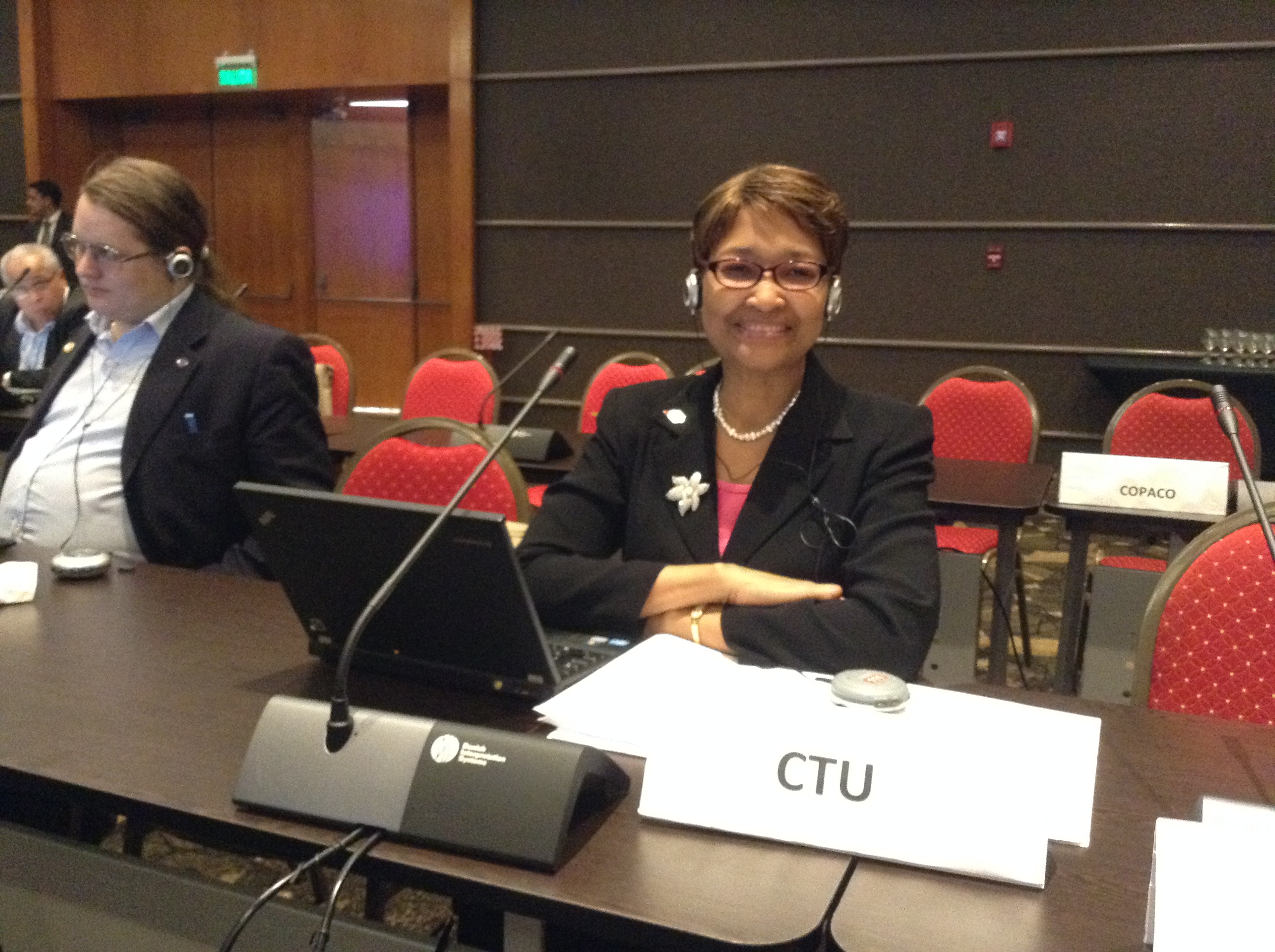
CTU Secretary General leads discussions on sustainable development goals at international forum
Asunción, Paraguay (24th February 2017) – The Secretary General of the Caribbean Telecommunications Union (CTU), Ms. Bernadette Lewis, led a discussion panel addressing the United Nations Sustainable Development Goals (SDGs) at the International Telecommunications Union’s (ITU) Regional Development Forum on 20th March in Asunción, Paraguay.
In her introductory remarks, the SG noted that in September 2015, the countries of the United Nations (UN) adopted 17 Sustainable Development Goals (SDGs) in itsTransforming our World: 2030 Agenda for Sustainable Development. The Agenda which came into force on 1st January 2016 seeks to “free the human race from the tyranny of poverty, heal and secure the plane and shift the world on to a sustainable and resilient path”. The SG explained that the achievement of these goals is a collective responsibility that requires collaboration and honest, dedicated cooperation by all global citizens, including governments, the private sector and civil society.
The discussants in the Panel, Teresita Palacios, President of CONATEL (National Telecommunications Commission), Paraguay; Jorge Torres, Deputy Secretary of COMTELCA (Regional Technical Commission of Telecommunications), Honuduras; Roberto Hirayama, Regulation Specialist, Anatel, Brazil; and Chiedozie Dickson Osuala, Manager Market Economics, Telecommunications Authority of Trinidad and Tobago (TATT); explored the role of different stakeholders in promoting the SDGs, and how information and communication technologies (ICT) could help in achieving them.
Without exception, the panelists were of the firm view that affordable access to ICT and Broadband were essential for the attainment of the SDGs. They pointed specifically to the potential of ICT to promote social inclusion and foster economic development but this would require extending networks to all national communities.
SG Lewis in summing up the contributions of the panelists emphasized the need for transdisciplinary collaboration in setting realistic goals, planning and execution of ICT projects. She noted that public awareness and education of all stakeholders were integral to the process.
Finally, demonstrated political will to drive ICT for development and measurement of the progress are mandatory in order for the potential of ICT to contribute to the attainment of the SDGs.
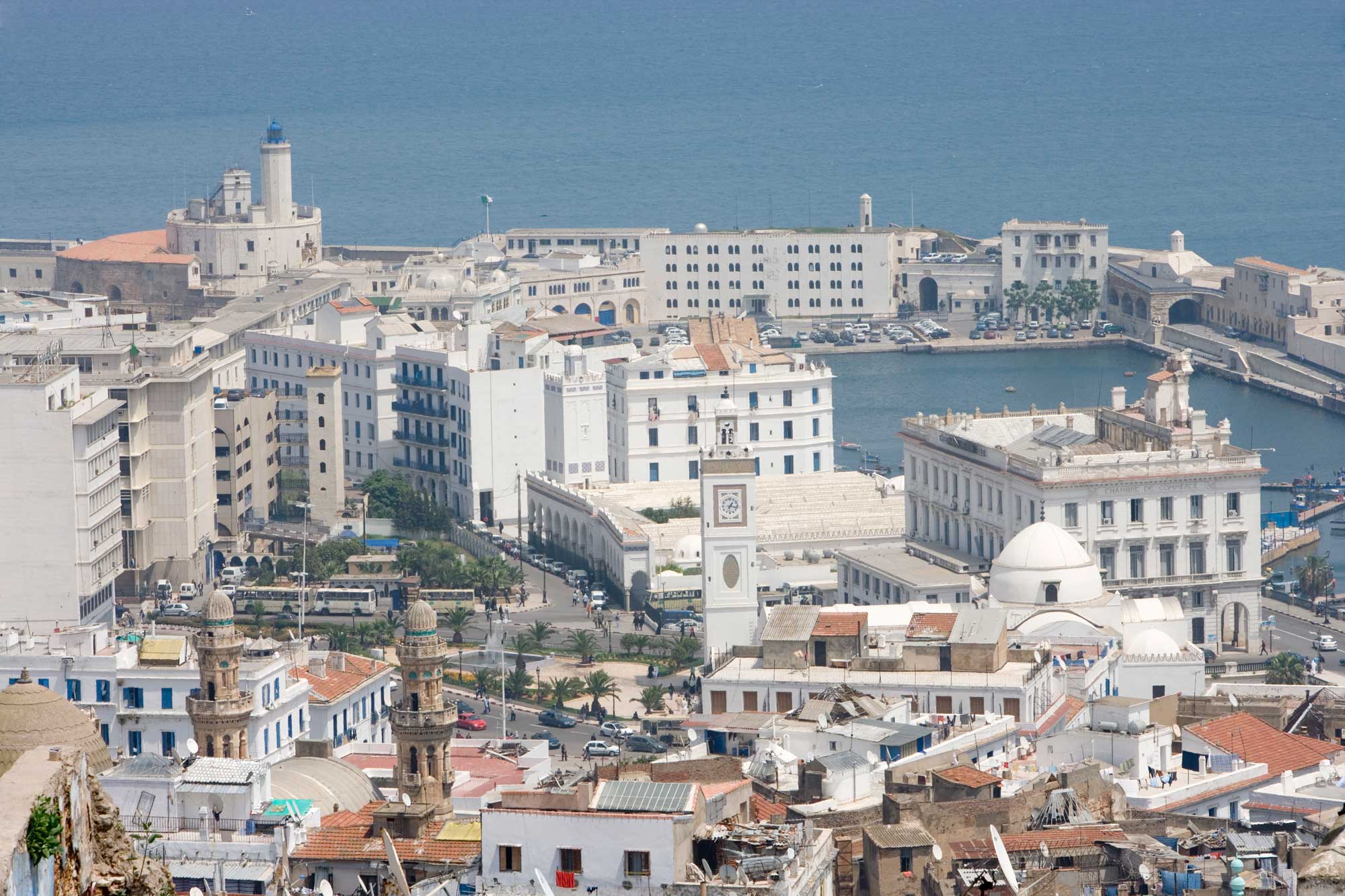
Algeria kicks off 1st UNWTO Regional Capacity Building Programme on Tourism Statistics
In the framework of the technical assistance that the World Tourism Organization (UNWTO) provides to Member States, especially in their development of sound statistical systems, the People’s Democratic Republic of Algeria has hosted the 1st Workshop on Regional Statistics of the Tourism Sector (13-15 February 2017). The program aims to enable the development of tourism statistics according to the United Nations standards at the national level and to implement the Tourism Satellite Account project over time. This three-year programme, which was launched this year and is to be concluded in 2019, consists of a series of capacity-building workshops for officials from national tourism administrations, national statistical offices, central banks and Immigration Offices.
On the occasion, UNWTO Secretary-General, Taleb Rifai, praised the efforts done by the Ministry of Tourism of Algeria to place the sector at the core of the economic development policies and recalled the importance of tourism statistics for tourism development.
“Statistics are essential as they are the basis to shape efficient tourism policies, very needed in a region where the sector has so immense potentials,” said Mr. Rifai.
Measuring the impact of the tourism sector through statistical data has been one of the key areas of work of UNWTO in the last decades. The Tourism Satellite Account is one of the pillars of this approach.
In parallel to the workshop, the Secretary General held bilateral meetings with government authorities including H.E. Abdelmalek Sellal, Prime Minister of the People’s Democratic Republic of Algeria. The discussions were focused on tourism’s potential in Algeria and the necessity to develop human capital. The Prime Minister acknowledged the declaration by the United Nations of 2017 as the International Year of Sustainable Tourism for Development and confirmed that his country shares the same vision, especially in the development of sustainable tourism which can guarantee each nation the realization of common objectives on the economic, environmental and cultural sustainability. Mr Rifai discussed at length with H.E. Abdelouahab Nouri, Minister of Land Management, Tourism and Handicrafts the strong potential that the country has in tourism and the technical assistance that UNWTO may provide to Algeria.
“Algeria is truly committed to creating a more competitive and sustainable tourism, a sector that can become one of the pillars of Algeria’s economy and a tool for diversification and inclusive growth,” he said.
The improvement of air connectivity of the country was praised by the Secretary General who also commended the support of the Algeria to Tunisia. “We hugely acknowledge the support that Algeria has provided not only through long-stay tourists in Tunisia, but through significant tourism expenditure in Tunisia as well. Standing together is the best thing we can do in the face of crisis to help recovery,” he mentioned.
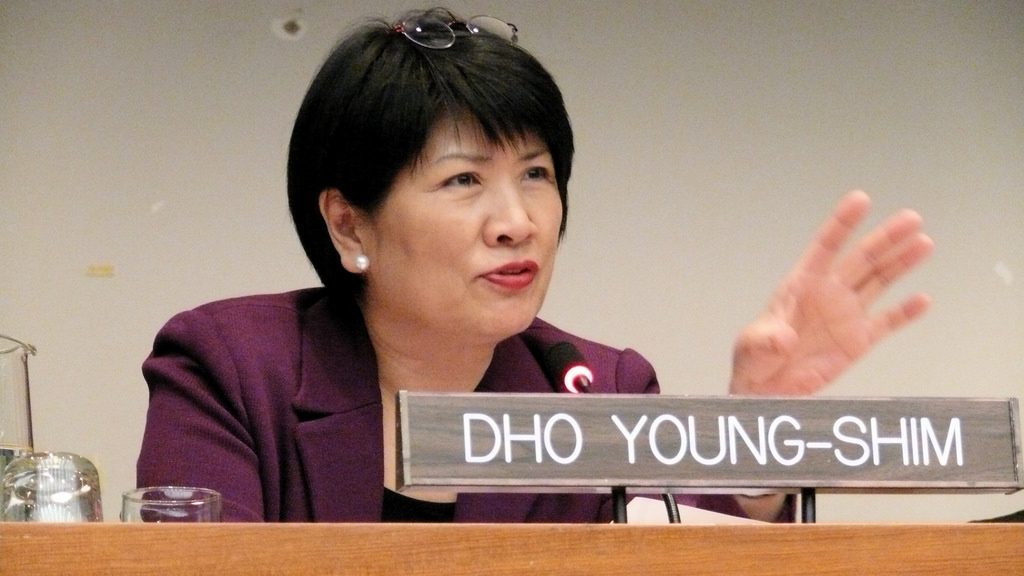
Positioning delivery of tourism performance over personal profile
What does it take to lead the world’s largest, most comprehensive tourism community? This is the question that many are trying to answer as the race for the next head of the UNWTO heats up for the role of Secretary General.
So far, a number of very capable tourism leaders and personalities have stepped forward with their candidacy, the process requiring their nations formally submit their nominations. To date, four continents have shown interest with names: Africa with two, Asia, the Americas one, and one from Europe. With the official date for closure of nominations still two weeks off, perhaps new names will be added to the final list for panel review of qualifications.
The race for the top job will have significant standards to maintain. In just two terms of leadership of the UN body tasked with promoting “responsible, sustainable and universally accessible tourism”, its outgoing Secretary General, Mr Rifai, a Jordanian national, is leaving very large shoes to fill.
As stated by its website, through a membership of “157 countries, 6 Associate Members and 500 Affiliate Members representing the private sector, educational institutions, tourism associations and local tourism authorities”, the UNWTO’s Secretary General has raised the bar on cooperative leadership across the global tourism community, both government and business. Rifai has brought a heightened level of profile, credibility and impact to the sector, shifting the image of tourism from a non-essential, indulgent leisure activity to an essential economic driver. And he has done this without raising the profile of himself.
This is why the highly competitive, and often extremely personal, nature of the competition for the top job has many raising eyebrows. Rifai’s tireless servant-leader style of leadership has become a hallmark of the organisation.
Amid all of the Which is why the approach of one candidate, South Korea’s AMBASSADOR DHO YOUNG-SHIM, is being looked to with interest both in terms of strength of qualification, and importantly, in appreciation of approach.
A tourism practitioner who has dedicated her life’s work to the sector, she understands from her own experience and exposure how nations around the world can use Tourism to elevate not just their economies, but their social fabric, their environmental protection, their national identity, and their ability to compete globally with other countries in getting tourists to visit as a prelude to strengthening their economies. Theory is one thing – reality is another. Her over 40 years in tourism, including 20 in the UN, gives her the strongest global perspective on the ability of tourism to effect meaningful change for the better of countries economically, specially, environmentally. Not to mention how to make the UN work harder to deliver results. She represents strength through her insider and outsider knowledge, credibility and critique. That’s the bottom line when it comes to recognizing and delivering on the opportunity of tourism, for one and all.
Ambassador Dho does not just talk ‘leadership first, not leaders’, she is walking her talk.
Unlike any other candidate in the race, Ambassador Dho is openly positioning her running mate – CARLOS VOGELER, a Spanish national born in Venezuela, educated in Spain and Canada, with a broad experience both in the private and public tourism sector, and currently in the role of Executive Director for Member Relations at the UNWTO, as well as Regional Director for the Americas.
The global/local; Asia/Europe/Americas; female/male; government/business combinations, together with the combined experience and expertise is an interesting and powerful one, and specially one quite focused on delivering results.
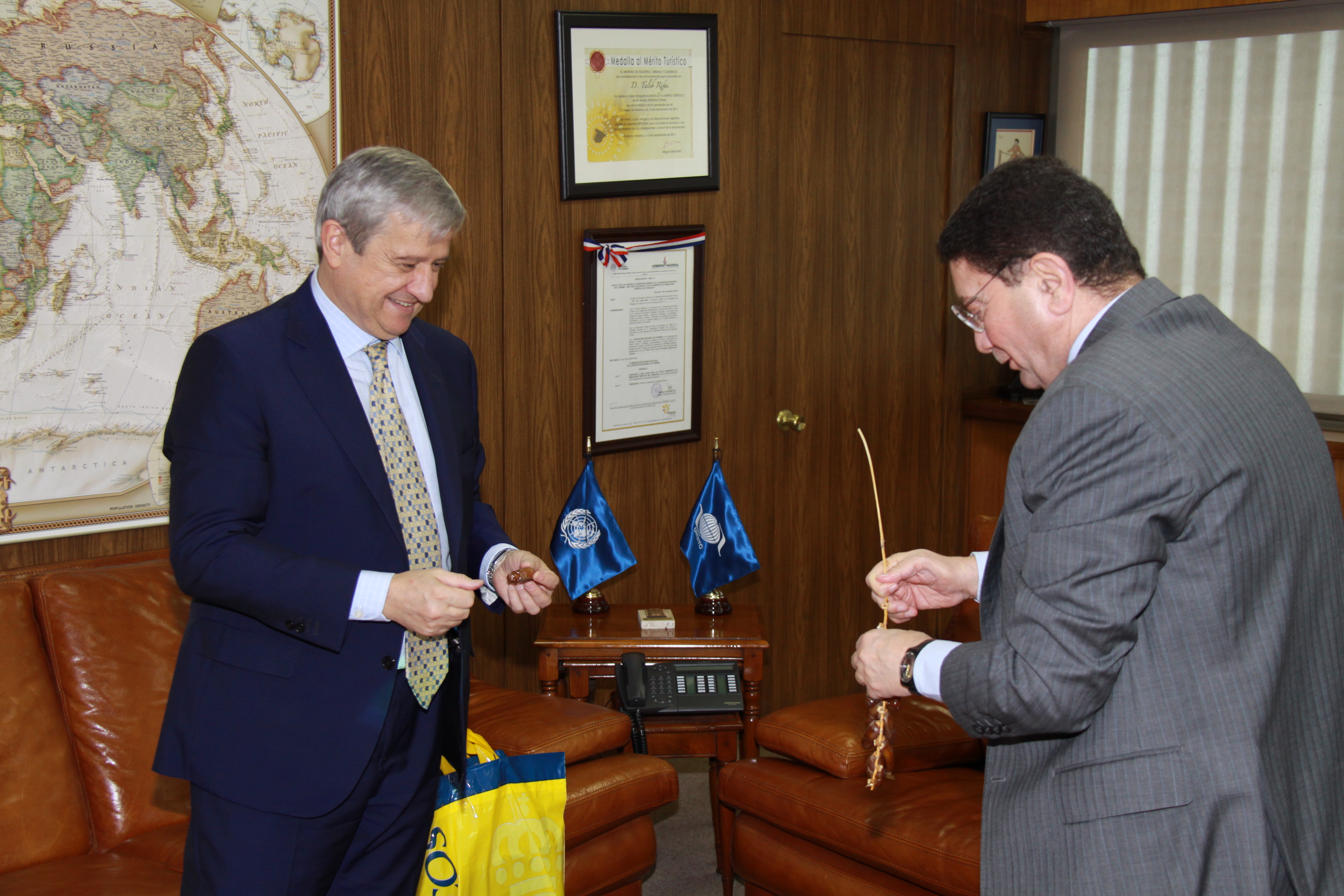
UNWTO hosts presentation of stamps commemorating International Year of Sustainable Tourism for Development 2017
UNWTO Headquarters in Madrid hosted the presentation on Tuesday of two Spanish stamps commemorating the International Year of Sustainable Tourism for Development 2017.
The United Nations declared 2017 as the International Year of Sustainable Tourism for Development, highlighting the potential of tourism to be a pillar of a sustainable, inclusive and equitable future for all.
UNWTO Secretary-General Taleb Rifai recalled that the Year aims to inspire change among all those involved in tourism, including tourists themselves, so that they are mindful of their role in travelling with respect for cultural heritage, the environment and the hosts that welcome them.
“This stamp is one of the key tools to reach all those traveling in Spain and engage them in making a positive impact. We are extremely grateful to the Spanish government and to Correos (the Spanish National Post Office) for this initiative”, said Secretary-General Rifai.
“It is always a pleasure to present a new stamp but, in this case, my gratification is greater because these stamps are dedicated to tourism, one of the most important emblems of our country,” underlined Javier Cuesta Nuin, President of Correos.
With a circulation of 14,000,000, the stamp will promote responsible tourism among Spaniards and the millions that every year visit Spain.
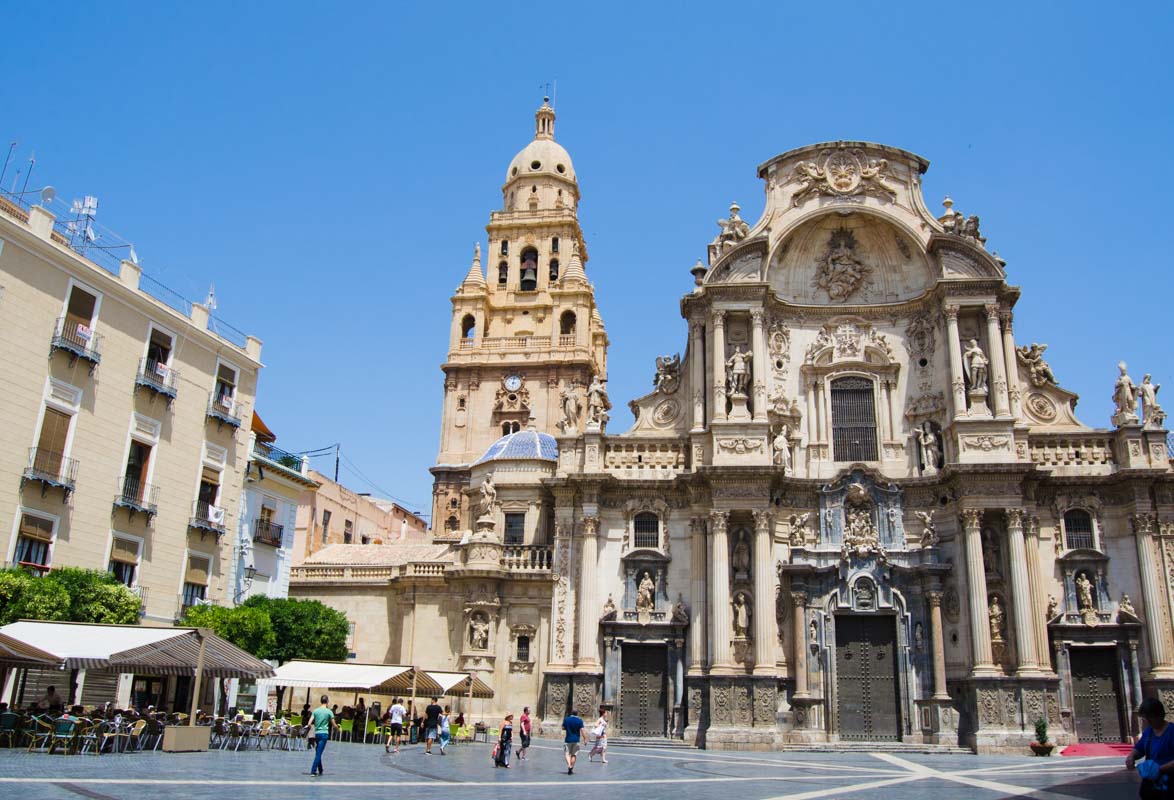
Innovation, technology and sustainability – pillars of Smart Destinations
Over three days (15-17 February) more than 100 speakers from 20 countries convened in Murcia, Spain to present solutions and experiences for ‘smart destinations’. The 1st UNWTO World Conference on Smart Destinations was organized by the World Tourism Organization (UNWTO) in cooperation with the Ministry of Industry, Tourism and the Digital Agenda of Spain and the Region of Murcia.
‘Smart destinations’ are key to sustainable development and contribute not only to advances in the tourism sector but also in societies at large. The use of technological solutions contributes effectively to evidence-based decision making, prioritization of measures and anticipation of future scenarios, which is essential for responsible management of tourism and its impacts.
Topics such as smart destination systems for regular and timely measurement, intelligent promotion of tourist sites and digital accessibility formed part of the parallel presentations given over the three days.
Improved accessibility of destinations thanks to new solutions, the opportunities and challenges deriving from geo-referenced data, big data and open data platforms, and enhanced environmental protection through smart tools were also part of the discussions. Furthermore, changing travel behaviours and increasing personalized customer experiences, new business models and the role of entrepreneurs, improved participatory processes supported by smart solutions, the relation between travellers and local communities, and the sharing of existing applications were at the core of the conference.
“‘Smart tourism’ is not a trend, but the future of tourism development,” said UNWTO Secretary-General Taleb Rifai opening the conference. “The International Year of Sustainable Tourism for Development 2017 is the perfect framework to conduct such an event, as it addresses major challenges and opportunities of the tourism sector in the coming years,” he added.
“Spain has not only accepted the concept of ‘smart tourism’, but it has also launched related projects and actions, such as the conversion of the island of El Hierro and other cities such as Palma into ‘smart destinations’, or the development of normative work on this topic,” said State Secretary of Spain for Tourism, Matilde Asián.
”Destinations have to assume the new global framework: a complex context in which tourists’ behaviour and new technologies are changing economic structures and related policies; we are in a new scenario of continuous evolution,” said the President of the Murcia region, Pedro Antonio Sánchez.
Additional information:
List of sponsors: Iberia, Amadeus, Union Pay, SAP, Drore Technology, Telefónica, Región de Murcia, Ayuntamiento de Caravaca de la Cruz, Diócesis de Cartagena, Grupo Fuertes, Reina, Estrella de Levante, Salzillo, Limcamar, CaixaBank, UCAM, Real e Ilustre Cofradía de la Santísima y Vera Cruz de Caravaca, Interapothek
Co-Sponsors: Fundación CajaMurcia, Iberdrola,
Collaborators: Instituto de las Industrias Culturales y de las Artes, Auditorio y Centro de Congresos Víctor Villegas, Turismo de Murcia, Visualtis, Predif, Iurban.es, ,International Federation for IT and Travel&Tourism, Tur4All

Closing borders risks jobs”, World Travel & Tourism Council warns US Administration
“The United States (US) is in danger of taking the same path it took after the 9/11 terror attacks, which led to a decade of economic stagnation in the Travel & Tourism sector”, said David Scowsill, President & CEO, World Travel & Tourism Council (WTTC), while speaking in Las Vegas today, 14 February 2017.
“Strict visa policies and inward-looking sentiment led to a $600 billion loss in tourism revenues in the decade post 9/11, as previously reported by the US Travel Association, with a noted 9% drop in international arrivals in the period of 2001 – 2009.
The Trump Administration is in danger of steering the country in the same direction, which could have a huge impact on the country’s Travel & Tourism sector, which generates over 8% of the country’s GDP and supports nearly 10% of total employment in the US”, warned Scowsill.
Airlines, hotels and travel agencies are all reporting drops in international bookings to the US, following the Executive Order banning visitors from seven countries to enter the country. This is the unintended consequence of the ban announcement, with business and leisure customers from around the world holding back on their travel plans.
Scowsill spoke directly at the Administration during his speech, offering five pieces of advice to the President’s advisors:
- Recognise that travel is a key generator of American jobs and economic growth.
- Keep tourism out of politics. Blanket bans on citizens from specific countries will not make the American people safer.
- Remember the decade of lost economic growth. Travellers have a choice and they will go elsewhere.
- Use the technology available to share information. That will ensure that only the right people arrive at borders in the first place.
- Consult with the industry in advance of change. This will make the implementation of policies more orderly, fairer and less damaging.
“For the President who has promised to create jobs and to make America great again, Travel & Tourism seems the most obvious answer. After all, the livelihood of millions of Americans depends on people being able to use planes, trains and automobiles to spend their tourist dollars.
Travel & Tourism thrives by breaking down barriers, not building them; by making it easier for people to travel, not applying blanket bans. Our sector bridges divides between cultures, fosters understanding across religious and geographic boundaries. It is a massive generator of jobs and economic growth.” Scowsill concluded.

ICTP President: : Newton’s third law and existential climate change
The author, Professor Geoffrey Lipman, is President of the International Coalition of Tourism Partners (ICTP) and co-founder of SUNx.
The International Coalition is a global alliance of tourism destinations and stakeholders in 153 countries promoting Green Growth + Quality= Businesss (link ICTP to http://www.ictp.travel )
Whatever combination of forces led to Donald Trump becoming President of the United States – and for at least the next 4 years, control of nearly a quarter of the global economy, with his finger on the nuclear button – remains a frightening mystery to most of us. Now that he has that control and is showing his disruptive leadership style, he would do well to remember Newton’s third law: “To every action, there is an equal and opposite reaction.”
Already many of his Executive Order initiatives have begun to demonstrate this reality – starting with his initial quasi ban on Muslims from 7 countries and the instant outrage, demonstrations, and court challenges. This also includes his “Day One – Repeal Obamacare” followed by the realization that you can’t without a replacement and that needs Congress to build as well as knock down, and his “Great Wall of Mexico” and Fix Sanctuary Cities mantra – both producing predictable defiance and deepening opposition, and on and on.
And you can’t play reality TV games by threatening to unilaterally impose tariffs or border taxes in a fit of pique and overturn delicate trade arrangements crafted to bring balanced benefits to all parties. You do so at the peril of retaliation and adding hidden costs to US consumers. Yes, it would be putting America first for Apple to build iPhones entirely in the USA – it would just make them prohibitively expensive, reduce sales massively, and put Chinese factories out of work. So, what then if China, already stung by currency accusations, and threats to its one China policy, decides to encourage its travelers to shun the USA? Chinese tourists are an important US export – the negative impact would pretty soon hit the US economy “bigly.”
Donald Trump is a man who is inclined to toss out an outrageous idea, and “double-down” on his positions while offering a glimmer of hope that he’ll change his mind, based on his “Art of the Deal” tactics. What he doesn’t seem to get is that you can’t bully or play legal games with sovereign state partners for long, the way you did as a businessman with small companies, a pseudo university, and loopholes in the tax code. The President of the United States cannot unravel decades of partnership obligations with a smart one-liner, the stroke of a pen, and a barrage of 140-character tweets.
Most importantly, Donald Trump would also do well to remember there is a real elephant in the room – climate change – that is existential and it doesn’t have a twitter account. He has already signaled his disdain for the Paris Treaty and placed shackles on the Environment Protection Agency in his first week in office, in addition to nominating a climate change sceptic as Administrator. And at the same time, he is trying to open dormant pipelines and pledging to give big oil a new state-supported lease of drilling life.
All this is happening while the science and the experts make it clear that Sandy-type storms, Louisiana-type floods, Kansas-type tornados, and California-style droughts will only get more intense, more frequent, and more costly. And it will hit everyone, everywhere – inside the US and with similar patterns around the world.
These realities won’t change because Donald Trump threatens to tear up the one deal that every country on Earth supports as the best chance for a survivable future. It’s time to “walk-back” the thoughtless anti-Paris rhetoric and get on board with the rest of humanity.
SUNX (Strong Universal Network) supports community climate resilience through Impact – Travel (pros/cons measured and managed, green growth at the core and 2050 future proofed). It’s X brand shows both the eXistential reality of climate change and the eXchange of innovation and learning through the SUN “Centres, Connections and Community” system.
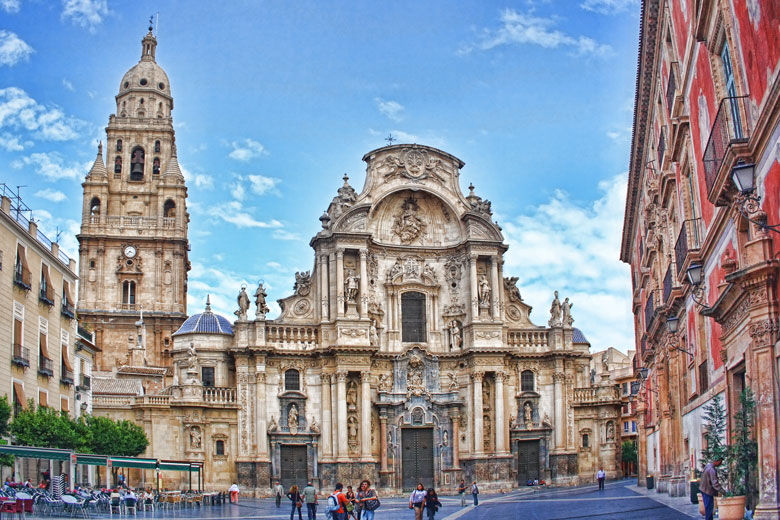
Murcia to host the 1st UNWTO World Conference on Smart Destinations
To advance and shape a tourism model for the 21st century based on innovation, technology, sustainability and accessibility – these are the aims of the World Conference on Smart Destinations to be held in Murcia on 15-17 February, organized by the World Tourism Organization (UNWTO), the Ministry of Energy, Tourism and Digital Agenda of Spain, and the Region of Murcia.
A few weeks following the launch of the International Year of Sustainable Tourism for Development, the city of Murcia has picked up the baton to offer a platform for the discussion of key issues in the global agenda of the sector, such as innovation, technology, sustainability and accessibility.
The 1st UNWTO World Conference on Smart Destinations will bring together government representatives, private sector entities, researchers and academics, as well as technology centres. Among the topics to be addressed is that of digital applications that make it possible to offer increasingly customized services and to differentiate tourist destinations that provide added value while preserving the natural, social and cultural environment.
“These themes, which are priorities of the work of the World Tourism Organization, define 21st century tourism: committed to ecosystems, local cultures and to economic and social development,” explained UNWTO Secretary-General Taleb Rifai. “It will be impossible to capitalize on the potential of tourism in aspects such as job creation and socioeconomic development if we do not commit to and move towards sustainable practices that are respectful of the environment and local communities,” he underlined.
The Conference includes an academic block in which research related to 21st century tourism will be presented. A session will also feature entrepreneurs who have developed highly innovative products or services in the area of smart destinations.
The event will conclude with the reading of a manifesto summarizing the contributions of the participants, which will form the basis of the first UNWTO report on smart destinations.
The International Year of Sustainable Tourism for Development, declared by the United Nations General Assembly and led by UNWTO, constitutes a common tool for global action towards a more responsible, inclusive and prosperous sector. To this end, the organizations in charge of the Conference encourage governments, private sector entities, consumers and civil society organizations to join the campaign and share their experiences.
Additional information:

UNWTO Secretary General Election: How it works?
The United Nations World Tourism Organization (UNWTO) generates market knowledge, promotes competitive and sustainable tourism policies and instruments, fosters tourism education and training, and works to make tourism an effective tool for development through technical assistance projects in over 100 countries around the world. The organization is based in Madrid, Spain.
UNWTO’s membership includes 157 countries, 6 territories and over 500 affiliate members representing the private sector, educational institutions, tourism associations and local tourism authorities. Its headquarters are located in Madrid.
UNWTO is not complete and struggles to speak for the entire world when it comes to travel and tourism issues. Surprisingly non-members are: Antigua and Barbuda, Barbados, Belgium, Belize, Comoros, Denmark, Dominica, Estonia, Finland, Grenada, Guyana, Iceland, Ireland, Kiribati, Latvia, Liechtenstein, Luxembourg, Marshall Islands, Micronesia, Nauru, New Zealand, Palau, Saint Kitts and Nevis, Saint Lucia, Saint Vincent and the Grenadines, Samoa, Singapore, Solomon Islands, Somalia, South Sudan, Suriname, Sweden, Tonga, Tuvalu, United Arab Emirates, United Kingdom, United States of America.
Any new Secretary General has to make it his or her priority to push non-members to become members and join the international United Nations community of tourism destinations.
“The Secretary-General shall be appointed by a two-thirds majority of Full Members present and voting in the Assembly, on the recommendation of the Council, for a term of four years. His appointment shall be renewable.”
The term of office of the current Secretary-General Taleb Rifai expires on 31 December 2017. It is therefore incumbent on the General Assembly to appoint a Secretary-General for the period 2018-2021 at its twenty-second session due to be held in Chengdu, China, in September/October 2017.
Consequently, in accordance with Article 22 of the Statutes and with Rule 29 of the Rules of Procedure of the Executive Council, the Executive Council will be required at its 105th session (11-12 May 2017 to recommend a nominee to the General Assembly.
For purposes of this nomination, it is proposed that the established practice be followed and, more particularly, that the rules adopted by the Council for the selection of a nominee for the post of Secretary-General at its twenty-third session in May 1984 be observed.
5. The above-mentioned rules, which have been consistently applied for the nomination for the post of Secretary-General since 1992, provide that:
“(a) only nationals of States Members of WTO may be candidates;
“(b) candidates shall be formally proposed to the Council, through the Secretariat, by the governments of the States of which they are nationals, and these proposals should be received not later than (date to be determined1 ), the postmark providing proof thereof;
“(c) voting shall be conducted by secret ballot in accordance with the Guiding Principles for the Conduct of Elections by Secret Ballot attached to the Rules of Procedure of the General Assembly;
“(d) the vote shall be decided in accordance with Article 30 of the Statutes and Rule 28 of the Council’s Rules of Procedure, by simple majority, defined as fifty
“(d) the vote shall be decided in accordance with Article 30 of the Statutes and Rule 28 of the Council’s Rules of Procedure, by simple majority, defined as fifty per cent plus one of the valid ballots cast; “
“(e) the selection of one nominee by the Council shall be conducted, in accordance with Rule 29 of the Council’s Rules of Procedure, during a private meeting, part of which shall be a restrictive meeting, as follows:
“(i) discussion of candidates shall be conducted during a restrictive private meeting at which only voting delegations and interpreters shall be present; there shall be no written record and no tape recording of the discussions;
“(ii) during the balloting Secretariat staff necessary to assist with the voting shall be admitted;
“(f) the Executive Council decides not to recommend a candidate proposed by the government of a member State in unjustified arrears (paragraph 12 of the Financing Rules attached to the Statutes); “(g) the Council shall select only one nominee to recommend to the Assembly.”
“(g) the Council shall select only one nominee to recommend to the Assembly.”
“(i) discussion of candidates shall be conducted during a restrictive private meeting at which only voting delegations and interpreters shall be present; there shall be no written record and no tape recording of the discussions;
“(ii) during the balloting Secretariat staff necessary to assist with the voting shall be admitted; “(f) the Executive Council decides not to recommend a candidate proposed by the government of a member State in unjustified arrears (paragraph 12 of the Financing Rules attached to the Statutes); “(g) the Council shall select only one nominee to recommend to the Assembly.”
In addition, the procedure established for the receipt of nominations that has been applied since 1992 provides the following with respect to the presentation of the nominations: “each nomination should be accompanied by a curriculum vitae and a statement of policy and management intent, expressing the nominee’s views on the manner in which he or she would perform the functions of Secretary-General. These particulars will be compiled in the form of a Council document and communicated to its Members within the prescribed time-limits. “In the interest of maintaining equality between the nominees and to ensure that their documents are readable, it is suggested that curricula vitae be confined to, say, two pages and statements of policy and management intent to six pages. The nominations will be presented in alphabetic order in the Council document.”
Since 1992, the time-limit set for the receipt of candidatures (to which the corresponding government supports, curricula vitae and statements of intent must be actually attached) has been established at two months before the session at which the Executive Council is required to select a nominee. The Secretariat consequently informs all the Members by note verbale of the receipt of each nomination.
Since 1997, the nominees for election to the post of Secretary-General have made an oral presentation of their candidature and intentions during the Council’s nominating session. Called in the Spanish alphabetical order of their surnames, the nominees are allotted equal time for making their presentations which are not followed by discussions.
In accordance with Rule 29(3) of the Rules of Procedure of the Executive Council, the recommendation to the Assembly of a nominee for appointment to the post of Secretary-General: “shall be made by a simple majority of the Members of the Council present and voting
If no candidate receives the majority in the first ballot, a second and, if necessary subsequent ballots shall be held to decide between the two candidates receiving the largest number of votes.”
In accordance with the constant practice of the Organization, recalled in decision 17 of 1984, a simple majority is “defined as 50 per cent plus one of the valid ballots cast”.
This rule was confirmed in 1988 and 1992 (decisions 19(XXXIV) and 19(XLIV)). In the event of an odd number, it seems in conformity with logic, with the ordinary meaning of words and with the dominant practice, to define it rather as representing the number of votes immediately higher than half of the votes validly cast3 .
As for the procedures of the “second” and “subsequent ballot” mentioned in Rule 29, should they prove necessary, the clarifications provided by the Legal Adviser in the Information Document for the Election of the Secretary-General in 1989 and confirmed in 2008 would apply in the event that two candidates should share the second place in the first ballot.
The consequence would be that another ballot (and as many additional as necessary for achieving the required majority) would be organized between the three candidates to decide which two candidates, having received the greatest number of votes, will subsequently participate in the final ballot. 12. Representation of a State by another Full Member of the Organization during the election of the nominee will follow the resolutions adopted by the General Assembly at its 19th session in the Republic of Korea in 2011 (resolution 591(XIX)), at its 20th session in Zambia/Zimbabwe in 2013 (resolution 633(XX)) and at its 21st session in Colombia in 2015 (resolution 649(XXI)). 13.
It is recalled that Members to which Article 34 of the Statutes and paragraph 13 of the Financing Rules attached to the Statutes are being applied at the time of the election are deprived of membership privileges in the form of services and the right to vote in the Assembly and the Council unless they have been granted a temporary exemption from the application of such provisions by the Assembly.
The procedure stated in this document has been put into practice successfully, and without giving rise to any particular difficulty, for the appointments carried out since 1992. 15. In line with the recommendations by the Joint Inspection Unit of the United Nations (JIU) relating to the selection and conditions of service of Executive Heads in the United Nations System Organizations (JIU/REP/2009/8), each applicant is requested to attach a certificate of good health signed by a recognized medical facility to the presentation of her/his candidature.
The Executive Council is invited: (a) To decide that the rules adopted by the Council for the selection of a nominee for the post of Secretary-General at its twenty-third session in May 1984 (decision 17(XXIII)), supplemented by those adopted at its thirty-fourth session in November 1988 (decision 19(XXXIV)), and at its fortyfourth session in November 1992 (decision 19(XLIV)) shall also be observed at its 105th session; (b) To confirm that, for the interpretation of the statutory rules governing the election of the Secretary-General and the decisions mentioned in subparagraph (a) above, reference shall be made to the contents of this document; (c) To invite the Member States to propose candidates for the post of Secretary-General for the period 2018-2021, ensuring that their nominations reach the Organization’s Headquarters (Capitán Haya 42, 28020 Madrid, Spain) two months before the inauguration of the 105th session of the Executive Council, i.e., by 24:00 hours Madrid time, 11 March 2017 (date to be confirmed), at the latest; (d) To request candidates to submit, together with biographical and career information, a statement of policy and management intent, expressing their views on the manner in which they would perform the functions of Secretary-General; and (e) To confirm that the 105th session of the Executive Council will select the nominee it should recommend to the twenty-second session of the General Assembly for the post of SecretaryGeneral of the Organization for the period 2018-2021.

Viajes El Corte Inglés commits to Global Code of Ethics for Tourism
Viajes El Corte Inglés has signed the Private Sector Commitment to the UNWTO Global Code of Ethics for Tourism, a key element of tourism enterprises’ efforts in the field of corporate social responsibility.
With more than 1.2 billion international travellers in 2016, tourism has become one of the most powerful catalysts for the development of countries. Its capacity to create employment — 1 out of every 11 jobs worldwide is generated by the sector — to promote environmental protection and to create synergies between nations makes it a vital tool of the 2030 Development Agenda.
In this context, the UNWTO Global Code of Ethics for Tourism constitutes an important roadmap to guide the increasing responsibility of all actors involved in the preservation of the environment, culture and local communities.
“The addition of Viajes El Corte Inglés to the roster of companies committed to the Global Code of Ethics for Tourism is one of the most significant milestones of 2017, particularly when we are celebrating the International Year of Sustainable Tourism for Development,” said UNWTO Secretary-General Taleb Rifai.
Viajes El Corte Inglés is also one of the companies participating in the project carried out by UNWTO and the Global Compact on tourism and the Sustainable Development Objectives (SDGs).
The Code includes principles such as respect for human rights and cultural heritage, the protection of the environment and the most vulnerable communities, as well as concepts such as inclusiveness, gender equality and accessibility. “This is a universal document that contains moral values that all societies of the twenty-first century have accepted as fundamental,” said the Secretary-General.
For his part Juan Luis Vassallo Saavedra, Director of Legal Affairs and Secretary of the Board of Directors of Viajes El Corte Inglés, explained: “Sustainability means much more than reforesting or practising philanthropy. It is a reaffirmation of our strong link with the society we form a part of and, above all, a way of creating lasting value.”
The Code of Ethics, which is currently undergoing a process of conversion into an international convention, was approved by the United Nations General Assembly in 2001 with the intention of inviting Member States to apply ethical principles relating to tourism. To date, 493 companies and associations from 67 countries have signed the Commitment.
Additional information:
UNWTO Ethics and Social Responsibility Programme
World Committee on Tourism Ethics
